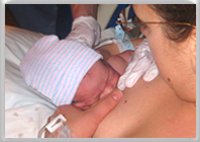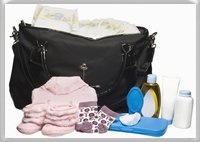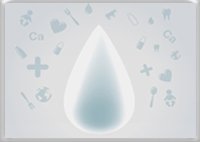How to Breastfeed: Go! (Part 3)
Continued from How to Breastfeed: Set! (Part 2)...

Ready!Set!Go! is a system that once helped me to prepare for breastfeeding and have everything handy at the right moment.
Previous sections helped you prepare emotionally, physically and also gave you a checklist of all the things you need.
Now let's get to the Go! part...
Go!
Right after the delivery breastfeeding process that you so clearly envisioned before becomes the source of confusion, frustration and even depression. Do your best to keep your head clear.
It is a new stage in your life. It is overwhelming, but by this point you know everything about breastfeeding you need to know.
Besides, women are born to feel and understand things about motherhood that nobody else does. Pregnancy and delivery get you and your body even more prepared.
You are totally capable of breastfeeding, taking care of your baby, and becoming a great parent. Keep things in this perspective, and you'll do great!
how to get there...
When I was pregnant I was always getting extremely overwhelmed every time I heard something I didn't know about how to breastfeed a baby. I felt like I needed to learn everything there is to learn.
Well, turns out not everything there is to learn is equally important.
Below is a list of things that deserve your attention. I put them in the order they are likely to appear after the delivery. I also included references to other articles.
After the delivery:
- Nurse your baby as soon as you can, preferably during the first hour after the delivery. This is when your baby is the most alert before he/she sinks into a deep sleep. C-section deliveries are different. Read more here.
- To help your baby latch, gently strike his/her lower lip with your nipple. Most babies will open their mouths and latch on in response to that. Read about latching on and positioning. Follow guidelines.
- Consider Biological Nurturing (laid-back nursing position) - letting your baby lead the nursing process. This is a truly intuitive approach that allows you to follow your baby’s instincts and reflexes. More about Biological Nurturing here.
- Once positioned and latched on correctly, let your baby nurse for as long as he/she wants. Sucking stimulates faster colostrum onset.
- If you are not sure whether your milk is released, watch and listen to your baby. Is there a swallow after every suck or two?
- If the hospital lactation specialist doesn’t come to visit you and your baby the day after the delivery, ask your nurse to arrange it.
- When the lactation specialist does visit you, don’t be shy to ask for step-by-step instructions. They are trained in walking you through the entire process. Try various positions. Discuss concerns. Be open.
- Your nurse may recommend taking your baby to the nursery for the night, so
that you could get some sleep. Decision is yours, but keep in mind: if not
directed otherwise, your baby will be given a bottle and a
pacifier at night. Beware of nipple confusion. Also, you need to get your
breasts stimulated for faster milk production, so nursing at night is important.
- When you come home with the baby, breastfeed on demand – as often as your
baby needs for as long as she/he needs. Look for baby's signs of fullness
and satisfaction – loss of interest in the breast, falling
asleep, getting distracted.
- Disregard the schedule. Your baby will naturally work out a schedule by the end of the first month or so. For now he/she needs to get as much nutrition as possible and you need every extra stimulation you can get to establish your milk supply. Typically infants nurse every 2-3 hours. Gradually, the intervals between feedings will get longer at night.
- During growth spurts your baby will want to nurse more often and stay longer at the breast. This is normal. It is a natural way of letting your body know that more milk is needed and this prolonged sucking boosts milk production.
- Always start nursing with the breast that you finished with the previous session and that hasn’t been emptied completely.
- Perform breast self-exam if you feel soreness or discomfort. During the first week or two after delivery, your milk supply is just getting established and your baby is just learning to nurse.

At times you may seem to have more milk in the breasts than your baby can consume. If you feel a lump or a hard spot, massage your breasts.
During the first week of nursing, my breasts were getting unevenly hard - engorged - all the time.
When mature milk comes in, it takes a couple of days for the milk production and your baby’s appetite to “agree” on the amount of milk needed. This initial engorgement is normal.
I massaged my breasts a lot and especially massaged the spots that were hard. The task is to push the milk out of these spots and towards the nipples. This should be the direction of massage movements.
Performing the massage while taking warm shower helped even more.
Warmth softened tissues and milk was coming out faster. I had to do this procedure for about 4 days. As one lump was drained, another one formed. It was particularly bad in the morning, since a lot of milk was produced at night.
By day 5 my supply adjusted and my breasts started getting evenly filled with milk. Why it was so important not to ignore the engorgement? - To prevent duct clogging and mastitis.
- If ever in doubt whether your baby is getting enough milk, here is the article to read.
- If you encounter any breastfeeding problems, act fast. Talk to a lactation specialist and review Breastfeeding Problems section.
I hope this list, as well as How to Breastfeed Part 1 and Part 2 will help you get through your toughest first weeks of nursing and set you off to a great start!
Home › How to Breastfeed: Set! (Part 2) › How to Breastfeed: Go! (Part 3)
The First Time I Breastfed My Little One Was...
We would love to hear about your experience of nursing your baby for the first time. No matter what it was like - please share to get support and encouragement, to brag or to simply tell your story!














